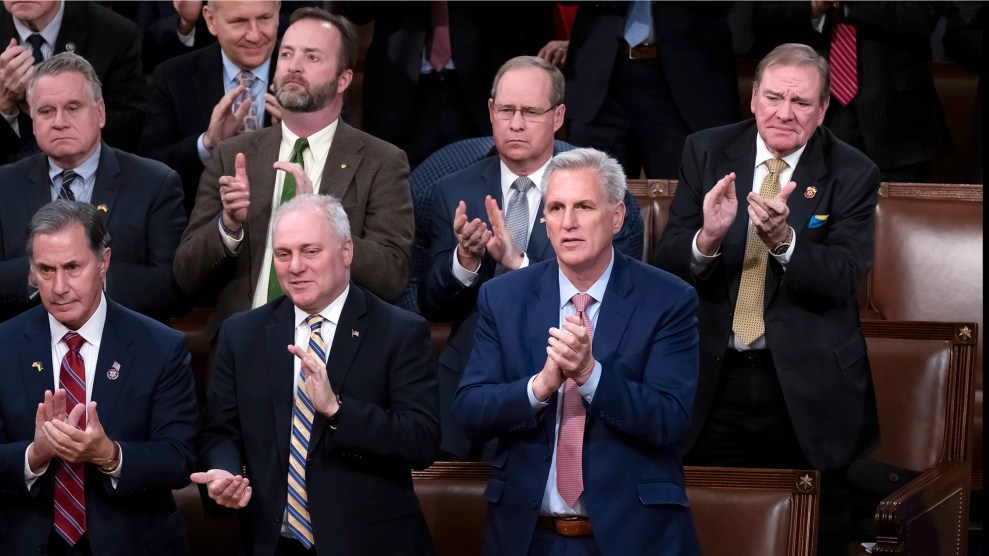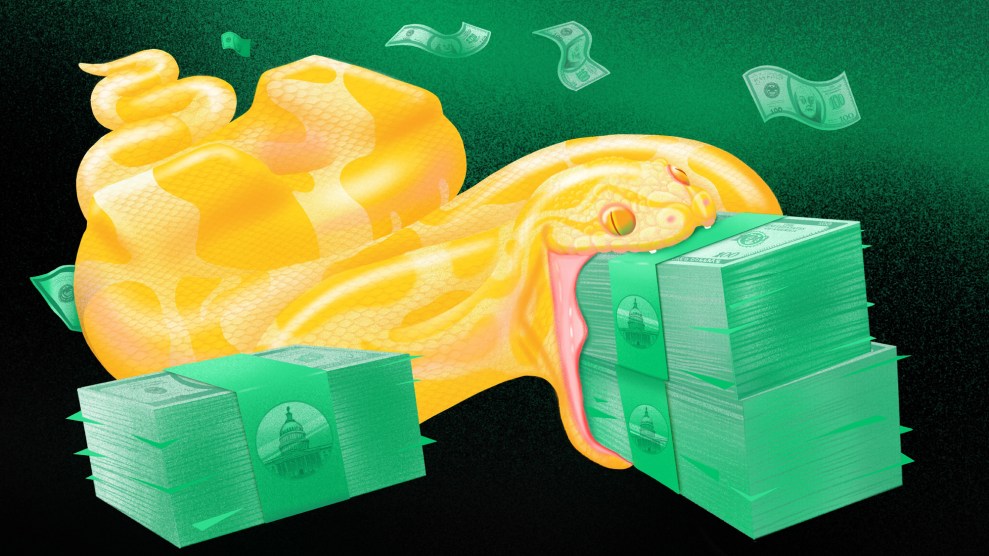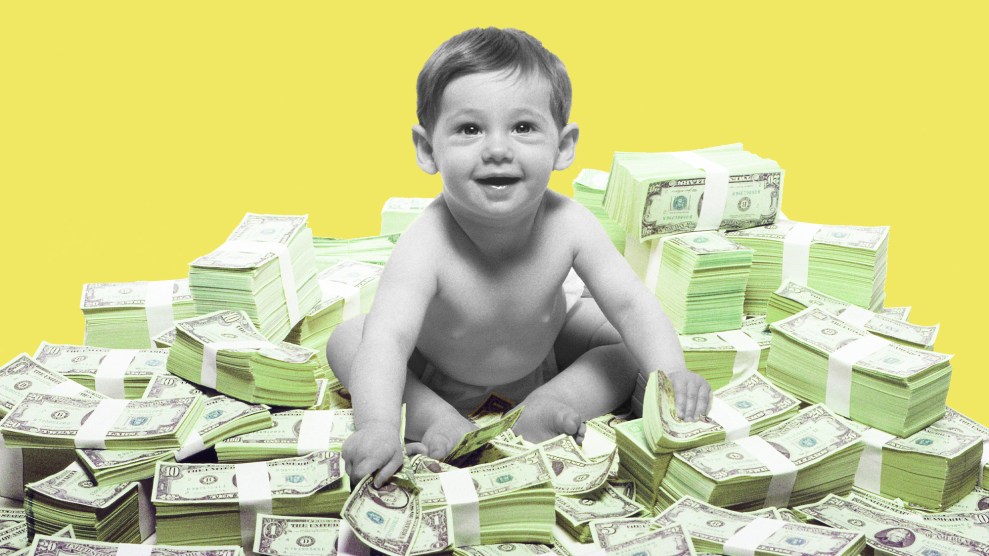
Fair Tax Act sponsor Earl "Buddy" Carter at a June 2021 "Fire Fauci" press conference. Tom Williams/AP
On Tuesday, Rep. Earl L. “Buddy” Carter (R-Ga.) introduced the Fair Tax Act, a House bill that proposes to abolish the IRS and replace the progressive federal income tax with a national consumption tax.
“Instead of adding 87,000 new agents to weaponize the IRS against small business owners and middle America,” Carter said in his press release, parroting a well-worn Republican lie, “this bill will eliminate the need for the department entirely by simplifying the tax code with provisions that work for the American people and encourage growth and innovation.”
That last part isn’t exactly true, either. In any case, the first thing to know about this “fair tax” bill is that it doesn’t stand a chance. It is controversial even among conservatives. But the House will reportedly vote on it anyway, because a floor vote was one of the concessions Rep. Kevin McCarthy (R-Calif.) made to right-wing members in his bid to become House speaker.
The bill itself is still worth pondering, though, if only because it’s a such a doozy. The “fair tax” is a complete makeover of the federal tax system. It repeals payroll taxes, gift and estate taxes, capital gains taxes, and personal and corporate income taxes. In their place, it institutes a 30 percent levy on all new, finished goods and services. (So that $10 six-pack would run you $13, and the feds get three bucks.)
Sales taxes are regressive—harder on the poor than the rich. To offset that, the proposal calls for monthly government “prebate” checks for all US citizens, payments that would be proportionately more meaningful to lower-income families.
This all might sound appealing in its simplicity: no federal returns, no keeping receipts, no sweating over allowable deductions and credits, no audits—and no IRS. But it’s actually a lot thornier than it seems, and results may vary. Here are a quick five things you should know about the “fair tax,” an expression one should always be careful to put in quotes.
- It isn’t new. Versions of the Fair Tax Act, which is based on an idea dreamed up during the 1990s by an advocacy group called Americans for Fair Taxation, have been introduced in almost every Congress since 1999, though they rarely make it out of committee. Most of the backers have been Republicans. In 2003, however, Rep. Collin Peterson (D-Minn.) and Sen. Zell Miller (D-Ga.)—neither of whom are still in office—cosponsored and introduced such a bill.
- It’s a boon for the wealthy. “The main problem,” UC Berkeley economist Gabriel Zucman told me in an email, “is that it would turbocharge inequality. Because the rich save most of their income.” In other words, replacing income taxes with a consumption tax amounts to a tax cut for the wealthy, whereas folks living paycheck to paycheck would face a substantial tax increase. As I wrote in a recent piece, Zucman and his Berkeley colleague Emmanuel Saez have found that when all of our taxes (federal, state, and local) are combined, the result is something like a flat tax—averaging 28 percent across income categories. The poorest Americans pay a bit less than average (~25 percent) while most very high earners pay more (30 to 35 percent), but the wealthiest of all, the billionaires, enjoy the lowest overall rate (23 percent). Under a “fair tax” plan, they might pay even less.
- It’s terrible for the middle class. Sales taxes, as things now stand, hit the poor hardest, sucking up about 10 percent of their income, while members of the top-earning 1 percent pay only a penny or two in tax per dollar earned. The proposed “prebates” would assuage some of the pain on the bottom end, but the only way to not screw over the middle class would be for the government to take a big revenue hit. In a 2013 interview, American Enterprise Institute tax expert Alan Viard explained to his AEI colleague James Pethokoukis that using prebates “introduces some progressivity, but compared to the taxes they’re replacing, this would be a big shift in the tax burden away from high-income groups toward middle-income and lower middle-income groups. And whatever you think about that politically, I think that’s just not viable.”
- Collections and tax evasion would be a huge challenge. As Leonard Burman of the Urban-Brookings Tax Policy Center pointed out a while back, former President George W. Bush’s 2005 tax reform panel rejected the “fair tax” notion because it was regressive and because prebates were expensive, hard for taxpayers to manage, and difficult to administer: “In addition, the panel was concerned a federal retail sales tax rate of 30 percent or more would result in widespread evasion and create real problems for states that rely heavily on their own sales taxes.” Collections and tax evasion are also a major challenge for today’s IRS. But that’s largely due to a dearth of funding over the past decade, and aggressive avoidance tactics by slippery rich characters like Donald Trump. (Maybe a prebate program would help democratize tax evasion!) As for collections, the Treasury Department’s inspector general for tax administration reported in 2020 that nearly 880,000 “high income” non-filers from 2014 through 2016 still owed the government $46 billion, and the IRS was in no shape to collect.
- Prebates would necessitate something the right loves to hate. Here’s one aspect of the “fair tax” that should really give pause to small-government conservatives: The Bush panel concluded in its 2005 report that cash payments “designed to reduce the burden of a retail sales tax on lower-income and middle-income taxpayers…would represent a new entitlement program—by far the largest in American history.” The panel estimated these payments would cost (in November 2022 dollars) between $900 billion and $1.2 trillion annually, and would “make most American families dependent on monthly checks from the federal government for a substantial portion of their incomes.”
So again, never gonna pass. But it sure will be interesting to see who votes for it.









